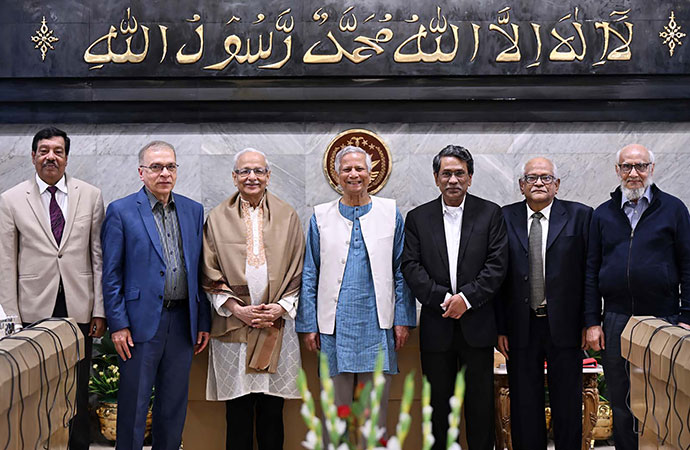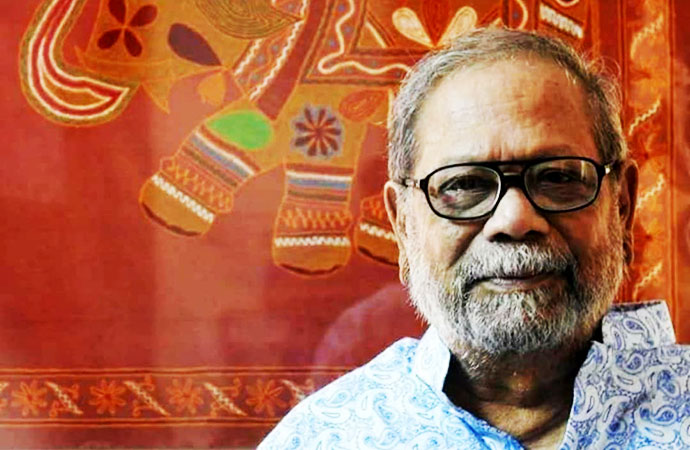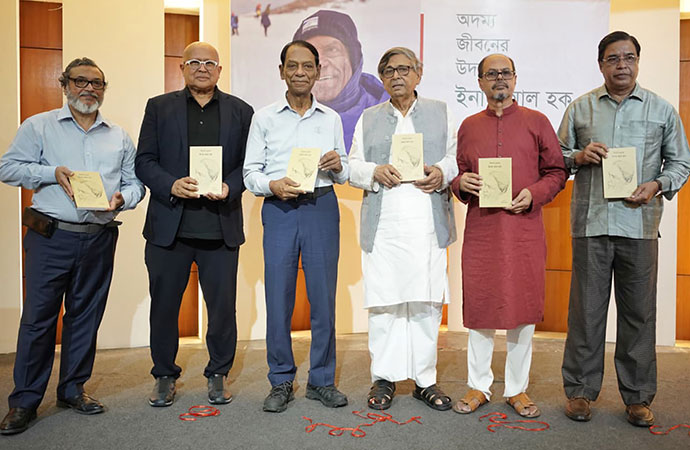Reportage

Photo: PID
The National Consensus Commission, as it came to be known, is often presented as the 'Jewel in The Crown' of the reform initiative underway in Bangladesh, under the leadership of its interim government. The chief adviser, Nobel laureate Dr Muhammad Yunus, has often raved about it to his foreign guests or on his trips abroad, claiming it to be a vibrant democratic exercise that was unique in both aim and form.
The NCC was placed at the apex of a set of sectoral reform commissions, that numbered six, and tasked with extracting the relevant suggested reforms from each to come up with a full, final set of reforms. The NCC was formed by the chairs of the six initial commissions, along with the chief adviser himself. These would then go on to form the July Charter. What was left unsaid was whether the responsibility for implementation of the Charter would fall on the interim government, or left to the next, elected government.
The NCC's series of talks with the political parties were led by its vice-chair, Professor Ali Riaz, who also headed the constitution reform commission earlier.
On July 29, the National Consensus Commission provided political parties with an initial draft of the July Charter. That was followed by one more week of televised consultations between more than 30 political parties, that the public had consumed with great interest, as a sort of substitute for parliament. The parties then submitted their opinions, which have now been incorporated into the integrated draft. The Commission has said that it will take further party feedback into account if necessary. Meanwhile, discussions have been taking place with experts on the implementation process, to be followed by consultations with political parties before the Charter is finalised.
The legal option of issuing an ordinance with a more durable foundation is being assessed now. As constitutional amendments cannot be made by ordinance, alternative special measures are under review.
Broadly, the draft July Charter, in its latest form, comprises three sections. The first sets out the background to the Charter; the second details the reform proposals on which consensus and decisions have been reached; and the third contains specific pledges on implementing the Charter and the reforms.
The initial draft had stipulated that political parties would pledge to implement the reforms within two years of forming a government following the next election. While the BNP agreed to this, Bangladesh Jamaat-e-Islami, National Citizen Party (NCP) and several other parties objected, demanding that the Charter be brought within a legal framework and that an implementation mechanism be defined.
In the revised integrated draft, the two-year implementation deadline has been removed. The Commission has clarified that the timeline in the first draft was kept as a "template". The integrated draft also specifies the details of each of the 82 proposals, noting where consensus exists and where differences of opinion remain.
In response to feedback from political parties, the National Consensus Commission introduced several amendments to the "pledges" section of the July Charter's draft.
Above the Constitution?
It is said in the latest integrated draft that the July Charter will be accorded a special status and a legal basis. It also states that the Charter has been framed in light of the universal will of the people, and shall therefore take precedence over existing laws or court judgments. A special constitutional provision would be put in place to ensure this.
The draft further stipulates that if any word, sentence, or policy of the July Charter conflicts with the existing Constitution or any other law, the Charter shall prevail. Its legality may not be challenged in any court of law. These are not points that came up in the publicly held discussions, but have been inserted in the integrated draft.
The sources add that nothing is final till it is signed, and the integrated draft has not yet been finalised. Certain legal aspects of the "pledges" section are still under review.
The interim government, which assumed office in the wake of the mass uprising that overthrew the Awami League-led government in August 2024, took up initiatives for reforms across various sectors of the state. Political consensus and decisions have already been reached on 82 reform proposals recommended by the six reform commissions formed in the first phase. These proposals form the basis of the July National Charter or July Charter.
The Commission's Vice-Chair, Professor Ali Riaz, said the integrated draft of the July National Charter had been prepared by accommodating the opinions of the parties on the preliminary draft. "We have tried to incorporate the views of all parties as far as possible. Some points have been modified, expanded or added. We are now re-examining some fine details. It should be ready for delivery to the parties by Friday morning," he added.
Pledges in the integrated draft
According to sources who have seen the text, the integrated draft requires political parties to pledge to ensure full implementation of the July National Charter; refer any questions over interpretation or application of the Charter to the Supreme Court; commit to an unceasing struggle to establish democracy; secure constitutional recognition of the 2024 uprising; ensure justice for killings during the uprising, grant state recognition to the martyrs, and provide proper medical care and rehabilitation for the injured.
It also states that recommendations in the Charter which are immediately implementable should be implemented before the next election.
The draft specifies that, as the July National Charter has been framed as the clearest and highest expression of the people's universal will, all of its provisions, policies and decisions shall remain in force and take precedence over Article 93(2) of the Constitution or any other law or judgment, through the enactment of a special constitutional provision.
The legal option of issuing an ordinance is being assessed now. As constitutional amendments cannot be made by ordinance, alternative special measures are under review.
Article 93 of the Constitution sets out the power to promulgate ordinances. It allows the President, in the absence of Parliament, to issue ordinances to make new laws or amend existing ones. Article 93(2) requires that such ordinances be placed before the first sitting of Parliament following their promulgation, and lapse if not approved within 30 days.
The July Charter's drafters are considering wording to ensure that an ordinance would not lapse, even if it is not approved in Parliament. However, Article 93 itself prohibits the issuance of any ordinance that would amend the Constitution. That is why the National Consensus Commission has been deliberating on this issue further.
Reform proposals
The National Consensus Commission's discussions with political parties in two phases produced agreement and decisions on 82 issues, all of which will be included in the Charter.
From the first phase, consensus was reached on 62 issues, including: elections to local government bodies; the establishment of district coordination councils; bringing political parties under the Right to Information Act; the appointment of Supreme Court judges; the establishment of a Supreme Court Secretariat; a permanent Attorney Service; a code of conduct for lawyers; an independent commission to investigate officials involved in genocide and electoral fraud; amending the Right to Information Act; an anti-corruption strategy; transparency in electoral financing; amending the Anti-Corruption Commission Act; the appointment process for ACC commissioners; and amendments to the Income Tax Act.
In the second phase, consensus and decisions were reached on 20 fundamental reform proposals.
Of these, 11 decisions were reached without dissent. Those are on: parliamentary standing committee chairs; delimitation of electoral constituencies; presidential clemency power; decentralisation of the judiciary - (a) decentralising the Supreme Court, (b) expanding subordinate courts to the upazila level; declaration of a state of emergency; appointment of the Chief Justice; constitutional amendments; term limits for the Prime Minister; formation of the election commission; formation of a police commission; expansion of citizens' fundamental rights.
Decisions on the remaining nine were reached with dissents. Those are: amendment of Article 70 of the Constitution; the provision allowing the Prime Minister to hold multiple posts; provisions on appointments to the Public Service Commission, the Comptroller and Auditor General, the Anti-Corruption Commission and the Ombudsman; women's representation in parliament; a bicameral parliament; the system of electing the President; caretaker government arrangements; the state's fundamental principles; the powers and responsibilities of the President.
All nine notes of dissent were submitted by the BNP.
BNP against the World?
The Bangladesh Nationalist Party has officially informed the National Consensus Commission about their objections with several issues that came up in the consolidated draft of the July Charter. The party's main bone of contention is with the proposal to place a document, the outcome of a political consensus, "above the constitution", as well as keeping it beyond the jurisdiction of the courts.
The BNP submitted its opinions over the draft in writing to the commission on Wednesday evening (Aug. 19). Four other parties also submitted their opinions over the draft on the same day. Following that, the commission said the deadline to submit the opinion had been extended up to 3pm Friday.
Salahuddin Ahmed, a member of the BNP standing committee, raised questions on Tuesday about the opening statement and the three clauses of the 'Commitment' section in the integrated draft of the July National Charter.
BNP sources said those were mainly the issues that had been conveyed to the commission in writing. The party disagreed with placing the July Charter above the constitution, barring courts from questioning the charter, and leaving the responsibility of interpretation solely to the Supreme Court.
In addition, opinions were given on some minor issues and wording of the charter. The BNP hoped that the July National Charter 2025 would be formulated, signed, and implemented on the basis of consensus. Through discussions with all concerned parties, a valid, legal, and constitutional process could be found for implementing the charter.
Talking to reporters, BNP standing committee member Salahuddin Ahmed said, "Several issues in the commitment section, in particular the proposals to place a political consensus above the constitution and barring the court from questioning it, are not acceptable and reasonable. Besides, it's not prudent to compare the July Uprising with the Liberation War."
The Aam Janatar Dal, NDM, AB Party and Bangladesh Khelafat Majlis also reportedly submitted their opinions in writing to the NCC on Wednesday.
The first draft of the July Charter, that was presented to the parties at the end of July, stated that once a new government is formed through elections, parties would commit to implementing the reforms within two years. BNP had agreed to this, but Jamaat-e-Islami, the National Citizen's Party, and others objected, demanding that the Charter be placed within a legal framework with a defined implementation mechanism.
In response, the consolidated draft revised the commitments. It is to this version that BNP has now raised fresh objections. Broadly, the party has objections to three clauses in the commitment section and to parts of the preamble.
Meanwhile, the mechanism for implementing the Charter and its reform proposals has not yet been finalised. The Consensus Commission is consulting experts and may begin discussions with the parties next week. Salahuddin Ahmed, who represented the BNP at these talks and is felt to have emerged from the televised phase with his reputation enhanced in the eyes of the nation, has questioned whether the Commission even has the authority to determine the implementation process. However, he added that BNP will respond if called to further discussions.
Points of departure
The draft states that the Charter is the "highest expression of the people's will," and that its provisions, principles, and decisions will be incorporated into the Constitution. Problematically, it also adds that where the Constitution or any existing law conflicts with its provisions, the Charter will prevail.
Salahuddin Ahmed expressed BNP's discomfort with such "supra-constitutional" arrangements. He argued that if the draft asserts that all provisions of the Charter will override the Constitution, it would create a dangerous precedent.
"It would not be right to set such a precedent for the nation as a whole," he said. "We must think about how to adopt and implement such an agreement within the legal and constitutional framework."
BNP will also be objecting to the part that says every provision, proposal, and recommendation of the Charter will have constitutional and legal force, and no question about its validity, necessity, or authority of issuance may be raised in any court.
The draft also states that recommendations that are immediately implementable will be carried out before the upcoming national election. On this, Salahuddin noted that the election schedule will be announced in mid-December, as promised by the Election Commission. Until then, there are a few months left-enough to draft laws and regulations. Ordinances can be issued in a month or so, and executive orders can be implemented. But the phrase 'before the national election' should be omitted. From which it is clear that BNP is very mindful to not allow the Charter to delay the elections.
Finally, the consolidated draft's preamble recalls how, after the Liberation War and the 1990 pro-democracy uprising, certain commitments were incorporated into the Constitution. Similarly, it proposes that following the July 2024 uprising, eight commitments be made to uphold democratic values, respect the people's will, and preserve constitutional convention.
The BNP however will present the view that today's situation cannot be equated with that of 1971. It will further point out that the draft's claim that July 2024 should be legitimised like the Liberation War was incorrect - the Liberation War was never in need of legitimisation.
So far, NCP has appeared in agreement with many of the points BNP has objected to. Unexpectedly, NCP sources indicate they are in line with the government's proposal to make the charter immune to legal challenge. With no compromise position identified by either side, and no signatures on the dotted line, this may all blow up in the IG's face yet.
Additional reporting by UNB.

























Leave a Comment
Recent Posts
Religion and Politics: A Toxic ...
At Dhaka University, cafeteria workers have been told not to wear shor ...
Enayetullah Khan joins AsiaNet ...
AsiaNet’s annual board meeting and forum was held in Singapore, ...
In a New York minute
Many leaders back a UN call to address challenges to ..
Defaulted loans at Non-Bank Financial Institutions ( ..
How the late Zubeen Garg embodied cultural affinitie ..